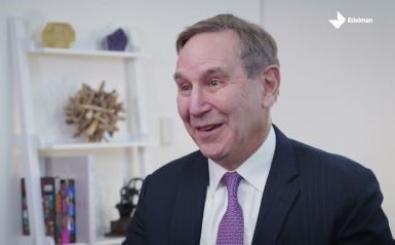The world is changing rapidly, and our Diversity, Equity and Inclusion (DEI) work must evolve and accelerate to meet our employees' and clients' needs. Edelman's DEI strategy is divided into five pillars: Employee Growth & Development, Awareness & Education, Thought Leadership, Partnership, and Business Impact.
Over the years, we have made progress through our ongoing efforts, including the creation of our employee networks, industry and community partnerships and regional trainings, but there is more to be done.
In June 2020, Richard Edelman committed to new racial equity goals including, accelerating diverse hiring and retention; diversifying our board; working with diverse NGOs and non-profits in local communities; continuing to encourage our clients to be more directly involved in action and more. Each day we continue to make advancements to create a work environment where DEI are woven into our culture, behaviors, and processes. We are moving beyond doing DEI to being and living DEI and together we will:
- Strengthen our culture of equity and inclusion by tapping into every employees' backgrounds, strengths, experiences, and passions and maximizing them in our work.
- Focus on inclusion to create a sense of community, connectedness and cohesion that will lead to decreased turnover of diverse staff, enhanced employee engagement and better client campaigns.
- Create a more equitable workforce through reinforcing fairness, equal opportunity for recognition and absolute transparency throughout the business.
Some of our ongoing activities include partnership efforts with diverse organizations and industry groups; Cultural Competency, Unconscious Bias and other training; employee network and cultural programming; and external thought leadership positioning, among other things.
DEI help to transform our company and our society. At Edelman, we empower our workforce to bring who they are to the table to help shape cultural movements and moments for the clients we serve.
We know that diversity of all types—gender, race, ethnicity, age, sexual orientation, religion, veteran's status, disability and more—equity and inclusion enhance our vibrant work culture and help deliver stronger business results. We also believe that a workforce, comprised of employees from all demographics and with diversity in backgrounds and experiences, we can develop more meaningful campaigns that reach and resonate with our clients' increasingly diverse customer and stakeholder bases. DEI enables us to provide innovative and creative solutions, which is central to who we are and what we do at Edelman.
Our organizational values guide everything we do—the relentless pursuit of excellence, freedom to be constantly curious and courage to do the right thing. As a family-owned firm, inclusion is a natural extension of these values. That is why we are committed to maintaining an open and nurturing environment that fosters collaboration, drives diverse thinking among our employees and partners, and creates a culture that respects and celebrates DEI inside the walls of our agency and within the different communities where our clients operate.
We've created several ongoing efforts to create a work environment where DEI are woven into our culture, behaviors, processes and operations with a focus on employee networks, training, recruitment and partnerships, among other initiatives. Our global DEI Council helps to inform our firm-wide strategy and implement in their regions.
Our six Employee Network Groups serve as vehicles to build an internal community in which employees can share, learn and grow—professionally and personally. These groups are the catalyst for helping our employees create a community within the larger Edelman family. Through the work of the networks, our employees play an active role in acknowledging, celebrating and educating fellow colleagues about diverse cultures, ideals and beliefs. Edelman has taken a stand on its journey to become an anti-racist firm through holding global employee discussions around cultural touchstone moments such as the ongoing efforts to fight systemic racism to encourage dialogue and drive understanding, as well as continued education from external speakers.



